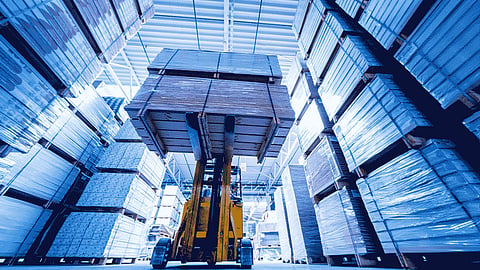Manufacturing and Logistics Fuel 22% Rise in Riyadh Warehouse Rents
Increased activity in the manufacturing and logistics sectors are contributing to the strong demand for high-quality and specialised warehouse facilities across the Saudi Arabia.
This has driven the annual rate of change in rents in cities like Riyadh to 22% at the end of Q3 2022, according to the latest analysis by global real estate consultancy, Knight Frank.
Faisal Durrani, Partner – Head of Middle East Research, explained: “The manufacturing sector is fast emerging as a key pillar in the government’s industrial strategy, now accounting for 8.3% of GDP.
"Government led incentives to boost domestic production of goods is attracting local and international investors, as well as boosting overall activity in this subsector.
“Separately, the pandemic fueled boom in online retailing which is fueling an ongoing buoyancy in warehousing requirements. And in Saudi, the same trend has taken hold, with a 90% increase in online shopping volumes/values over the last 12 months.
Agility Saudi Warehouse First to Earn ‘Green Building’ Status in GCC
“In addition, government led initiatives to boost the manufacturing sector are also contributing to the mismatch between demand and supply, particularly for internationally specified, high-quality warehouse facilities and last mile logistics facilities.
"Unsurprisingly, when combined with the severe shortage of high-quality warehouses, rents in cities like Riyadh now stand as high as SAR 250 per square metre, representing an increase of 22% over the last 12-months, with occupancy standing at 96%.”
Similarly, Knight Frank says, warehouse rents in Jeddah have also grown by 22% over the same period and now average SAR 179 psm, with occupancy levels of around 96% at the end of Q3 2022.
Multiple Sectors Driving Demand
Harmen de Jong, Partner – Real Estate Strategy & Consulting added: “The lack of supply has been a legacy issue for the market and as the economic transformation accelerates, the shortage of high-quality warehousing is sustaining upward pressure on rents.
"As more retailers strengthen their online presence, the challenge to find high quality warehouses will only grow more acute.
“In addition, as the Kingdom emerges as a logistics powerhouse, re-exports are growing, rising in value by 23% during 2021 alone. Indeed, demand for logistics hubs is now a significant driver of demand.
"Other manufacturing industries such as the pharmaceuticals and automobile production sectors are also contributing to rising levels of warehouse requirements."
Andrew Love, Partner – Head of Occupier-Landlord Strategy & Solutions and Head of Middle East Capital Markets commented: “The sustained growth in warehousing demand will maintain upward pressure on rental rates, which is unlikely to reverse until better quality stock enters the market.
"Subject to the speed of construction and assuming there are no delays in announced schemes, we expected a marginal 5% increase in Riyadh’s warehousing supply by 2025.
“As things stand, the city’s existing stock consists mainly of low quality, aging warehouses located near the city’s dry port, which is at odds with what occupiers are looking for: high quality, modern facilities, built to international specifications”.
A New Dawn for Warehouses
On market trends, Knight Frank pointed rapid changes in the Industrial sector. With the emergence of automated facilities, the Saudi Ministry of Industry and Mineral Resources launched a program to automate 4,000 factories.
The primary aim is to elevate the standard and ensure that factories are built with the best global requirements.
“Industrial occupiers have also been transitioning into cleaner energy sources, such as the installment of solar panels. Businesses are expecting to reduce operational costs as well as contribute to the Kingdom in achieving its 2060 net-zero target” Durrani explained.
As part of Vision 2030’s aim to use cleaner energy sources, Knight Frank says, several industrial occupiers are installing solar panels as they begin the transition to greener energy sources.
For instance, Al-Munaijam Foods installed over 3,500 solar rooftop panels on their temperature-controlled warehouse in Riyadh, aiming to help the Kingdom in reaching their green ambitions. The installed solar panels reduce up to 38,000 tons of carbon emissions per annum and 30% of the total energy requirements.
The obvious benefits of switching to renewable energy entirely, or as a means to supplement traditional energy sources will aid the Kingdom in achieving its 2060 net-zero target, while also reducing operational costs for businesses.
Read More: Saudi Arabia Launches Special Integrated Logistics Zone in Riyadh


